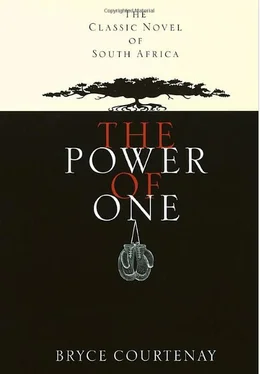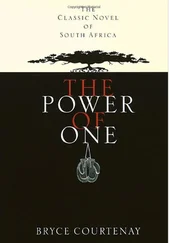Брайс Кортни - The Power of One
Здесь есть возможность читать онлайн «Брайс Кортни - The Power of One» весь текст электронной книги совершенно бесплатно (целиком полную версию без сокращений). В некоторых случаях можно слушать аудио, скачать через торрент в формате fb2 и присутствует краткое содержание. Жанр: Современная проза, на английском языке. Описание произведения, (предисловие) а так же отзывы посетителей доступны на портале библиотеки ЛибКат.
- Название:The Power of One
- Автор:
- Жанр:
- Год:неизвестен
- ISBN:нет данных
- Рейтинг книги:4 / 5. Голосов: 1
-
Избранное:Добавить в избранное
- Отзывы:
-
Ваша оценка:
- 80
- 1
- 2
- 3
- 4
- 5
The Power of One: краткое содержание, описание и аннотация
Предлагаем к чтению аннотацию, описание, краткое содержание или предисловие (зависит от того, что написал сам автор книги «The Power of One»). Если вы не нашли необходимую информацию о книге — напишите в комментариях, мы постараемся отыскать её.
The book is made to movie with the same name.
The Power of One — читать онлайн бесплатно полную книгу (весь текст) целиком
Ниже представлен текст книги, разбитый по страницам. Система сохранения места последней прочитанной страницы, позволяет с удобством читать онлайн бесплатно книгу «The Power of One», без необходимости каждый раз заново искать на чём Вы остановились. Поставьте закладку, и сможете в любой момент перейти на страницу, на которой закончили чтение.
Интервал:
Закладка:
‘Now listen good. It is for an emergency. Only if you have to can you use some of it. But you must tie up the change like I just showed you and put it back in your pocket with the safety pin. If you don’t need it you must give it to your oupa, it is his change.’
The station master entered and told us that the train was on time and we had five minutes.
‘Quick, man, get your tackies,’ Mevrou said, giving me a push towards the suitcase.
I was seized by a sudden panic. What if I opened my suitcase and she saw my suckers? I placed the case flat on the floor and opened it so the lid was between Mevrou and me, preventing her from seeing inside. Just as well, a green sucker had worked out of its hiding place in my shorts and my heart went thump. Phew! I removed the tackies and quickly snapped the case shut. I slipped each foot carefully into a paper boat and Mevrou tied the laces. I tried desperately to memorise how she did this but wasn’t sure I had the idea.
‘Please, Mevrou, will you teach me how to tie the laces so I can take my tackies off in the train?’
Mevrou looked up, alarmed. ‘You must not take your tackies off until you get to Barberton. If you lose them your oupa will think I stole the money he sent. You keep them on, do you hear me now?’
The train could be heard a long way off and we left the waiting room to watch it coming in. Real walking in my tackies was difficult and very different from the three or four tentative steps I had taken in Harry Crown’s shop. I stumbled several times as I went phlifft-floft, phlifft-floft from the waiting room to the edge of the platform. Bits of newspaper crept up past my ankles and I had to stop and press them back in.
With a deafening choof of steam, immediately followed by two short sharp hisses and a screeching sound of metal rubbing on metal, the huge train pulled into the station, and carriage after carriage of black people went by. They were laughing and sticking their heads out of windows and having themselves a proper good time. Finally the last two carriages and the goods van came to a halt neatly lined up with the platform The two end carriages read South African Railways First Class and Second Class respectively. I had seen pictures of trains of course, and sometimes at night as I lay in the small kids’ dormitory I had heard a train whistle carried in the wind, the beautiful sound of going to faraway places away from the hostel, Mevrou, the Judge and his Nazi stormtroopers. But I must say I wasn’t prepared for anything quite as big and black and blustering with steam, smoke, fire, brass pipes and hissing pistons.
Africans appeared as if from nowhere. They carried bundles on their heads which they handed up through the third-class carriage windows to the passengers inside and then climbed aboard laughing with the excitement of it all. From inside the carriages came song and more laughter and a great deal of shouting and good-natured banter. I knew at once that I would like trains.
The guard leapt down onto the platform carrying a canvas bag with Mail stamped on the outside. He handed it to the station master who gave him an identical bag in return.
The station master introduced the guard to Mevrou. ‘This is Hoppie Groenewald, he is guard and conductor until you get to Gravelotte. He will look after the boy.’
Hoppie Groenewald grinned down at me and tipped his navy blue guard’s cap to Mevrou. ‘No worries, Mevrou, I will look after him until Gravelotte. Then I will hand him over to Pik Botha who will take him through to Kaapmuiden.’ He opened the door of the second-class carriage and put my suitcase into the train and indicated that I should enter. The three steps up into the carriage were fairly high and I put my tackied foot on the bottom step. As I put my weight on the step the toe of the tackie buckled and I fell on my bum on the platform. Wearing shoes was a much trickier business than I had first supposed. A bit distressed, I wondered how adults seemed to manage so easily. I tried to get up but the tackies were too big and I couldn’t get a proper grip on the loose gravel which covered the platform.
‘Get up, man!’ Mevrou said, visibly annoyed. She shook her head, ‘For God’s sake! Even now you make trouble for me.’
Hoppie Groenewald put the canvas mail bag on the platform, and bending down he grabbed me under the armpits and hoisted me high into the air and through the door to land inside the carriage.
‘No worries, little brother, I too have fallen up those verdomde steps many a time. I, who am a guard and soon to be a conductor, and who should know better.’
He retrieved the mail bag and put it next to my suitcase. Then he hopped up the steps without even looking and unhooked a neatly rolled green flag from above the door of the carriage. He unfurled the flag and absently pulled at a chain attached to a button on his navy serge waistcoat and withdrew a large silver whistle from his fob pocket.
‘Watch the Kaffirs get a fright,’ he said with a grin. He showed me how to hold onto the handrail inside the door and lean out of the carriage so I could see down the full length of the train to the third-class carriages. He then jumped back onto the platform and began to wave the flag, giving a long blast on his whistle.
You should have seen the kerfuffle. Africans who had left the train to stretch their legs or have a pee scrambled frantically to get through the doors of the carriages as the train began slowly to move, laughing and yelling and climbing on top of each other. Hoppie Groenewald gave two more short blasts on his whistle and hopped aboard the train.
‘Goodbye, Mevrou. Thank you,’ I shouted, waving at her.
‘Keep your tackies on, you hear!’ Mevrou shouted back.
It was a dry-eyed farewell on both sides. I ardently hoped the Rooinek and Mevrou would never have to see each other again.
Hoppie Groenewald closed the carriage door as the train began to gather momentum. He quickly refurled the flag and clicked it back into its holder next to a red one above the door. Then he picked up my suitcase and opened the door to the nearest compartment.
The train was moving along smoothly now and I enjoyed the comforting, predictable clackity clack, clackity clack of the carriage wheels.
The empty compartment had two bright green leather seats facing each other, each seat big enough for three adults. A small table, which I was later to discover turned into a wash basin, was positioned between the two windows. The rest of the compartment seemed to be panelled in highly varnished wood and immediately above each green leather seat was a glass frame about ten inches high running the length of the seats. Inside the frames were lots of photographs. It was all very posh. Before it got completely dark, Hoppie Groenewald turned on the compartment lights and all seemed very cosy… just like the beginning of a proper adventure.
‘It’s all yours until we get to Tzaneen. After that who knows. No worries, Hoppie will take good care of you.’ He looked down at my tackies, bits of newspaper were sticking out of the sides and up past my ankles.
‘The old cow can’t get you now, take them off,’ the guard said. I tugged the canvas shoes off. My feet were hot and uncomfortable and had turned black from the newsprint rubbing off on them. It felt delicious to squiggle my toes again. Hoppie Groenewald stuck his hand out. ‘Shake a paw. You know my name but I haven’t had the pleasure.’
I’d already thought about what Harry Crown had said and had decided to take his advice and call myself Peekay. ‘Peekay,’ I said tentatively. I pronounced it in English, the way Harry Crown had, so it sounded like a proper name.
I suddenly felt new and clean. Nobody ever again would know that I had been called Pisskop. Granpa Chook was dead and so was Pisskop. The first two South African casualties in the Second World War.
Читать дальшеИнтервал:
Закладка:
Похожие книги на «The Power of One»
Представляем Вашему вниманию похожие книги на «The Power of One» списком для выбора. Мы отобрали схожую по названию и смыслу литературу в надежде предоставить читателям больше вариантов отыскать новые, интересные, ещё непрочитанные произведения.
Обсуждение, отзывы о книге «The Power of One» и просто собственные мнения читателей. Оставьте ваши комментарии, напишите, что Вы думаете о произведении, его смысле или главных героях. Укажите что конкретно понравилось, а что нет, и почему Вы так считаете.












